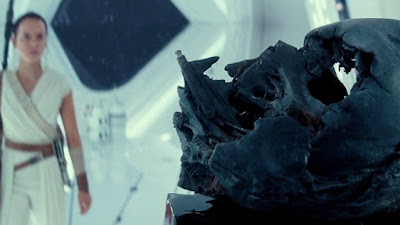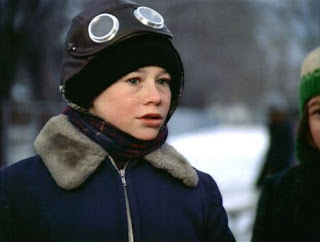But, I couldn't walk into any store this year without having to navigate through some monolithian display of Funko big-head vinyl dolls with increasingly obscure and arcane origins, yet still maintaining the style that reduced every subject to an expression-less big-black-eyed drone. Some you couldn't even tell apart.
People buy these things. And, if one didn't have enough to dread about the future, one can only imagine that the Pop! figures are going to go the way of LEGO® and start showing up in films, so you can by the merch-based-on-the-movie-based-on-the-merch. Dante couldn't have created a more circular path to Hell.
But, I digress...
This is the coda to Waiting for Guffman, Christopher Guest's film of the preparations for the sesquicentennial celebration of the founding of Blaine, Missouri, complete with parade and a live-theater musical about the town, conceived and directed by Corky St. Clair, artistic director of the city's theater group. The cast puts a lot of hope into the apparent interest of a New York theater impresario named Mort Guffman, who might—just might—be interested enough to take it to New York. But, things do not go as planned, and the film ends with a review of what happened to the play's participants after its performance.
The last segment—interspersed with the credits—is of Corky's post-Blaine activities, moving back to New York and opening a Hollywood-themed memorabilia shop, selling merchandise based on...well, let us say, "unique" productions. I found it hilarious and not entirely inconceivable.
After all, I'm still eyeing that 2001 "Black Monolith" action figure.
The Set-Up: Corky St. Clair (Christopher Guest) shows us around his memorabilia shop.
Action!
CORKY ST. CLAIR: And I suppose that the cake-and-eat-it-too part of this whole story is that another dream of mine has come true, which is that I've gotten to open...
CORKY: ...this shop... where I have all my show business treasures and all my memorabilia.
CORKY: This is without a doubt, one of my favorite items. Um, My Dinner With Andre action figures...
CORKY: ...and what you can do, which is so cute, is you can reenact the whole scene. You know, where the two guys talk to each other and say, you know...
CORKY: "Boy, I'm sure glad you found a good restaurant. "You know, it's so hard these days to get in. Who do you know?"
CORKY: I'm trying to get... it's very rare... the one... the action figures for Das Boot, 'cause I love to do that whole claustrophobic thing inside the sub where they're, you know, "Das kande, Das mushten...."
CORKY: That whole German thing. Can't speak German, but it sounds like sort of a bunch of barnyard animals, "muck, muck, muck," making that noise and sweatin'.
CORKY: Uh, over here, these are my big heads, I call 'em, starting with Anthony Michael Hall, one of the brat packers.
CORKY: In fact, in the background there,
CORKY: Over here, some new lunchboxes we've gotten in, The Remains of the Day lunchbox,
CORKY: ...and the kids, they're just having such a good time with these, you know. Kids don't like eating lunch at school, but if they're got a Remains of the Day lunchbox, they're a whole lot happier.
Waiting for Guffman
Words by Eugene Levy and Christopher Guest
Pictures by Roberto Schaefer and Christopher Guest
Waiting for Guffman is available on DVD and Blu-Ray on Warner Home Video.






















































































































































